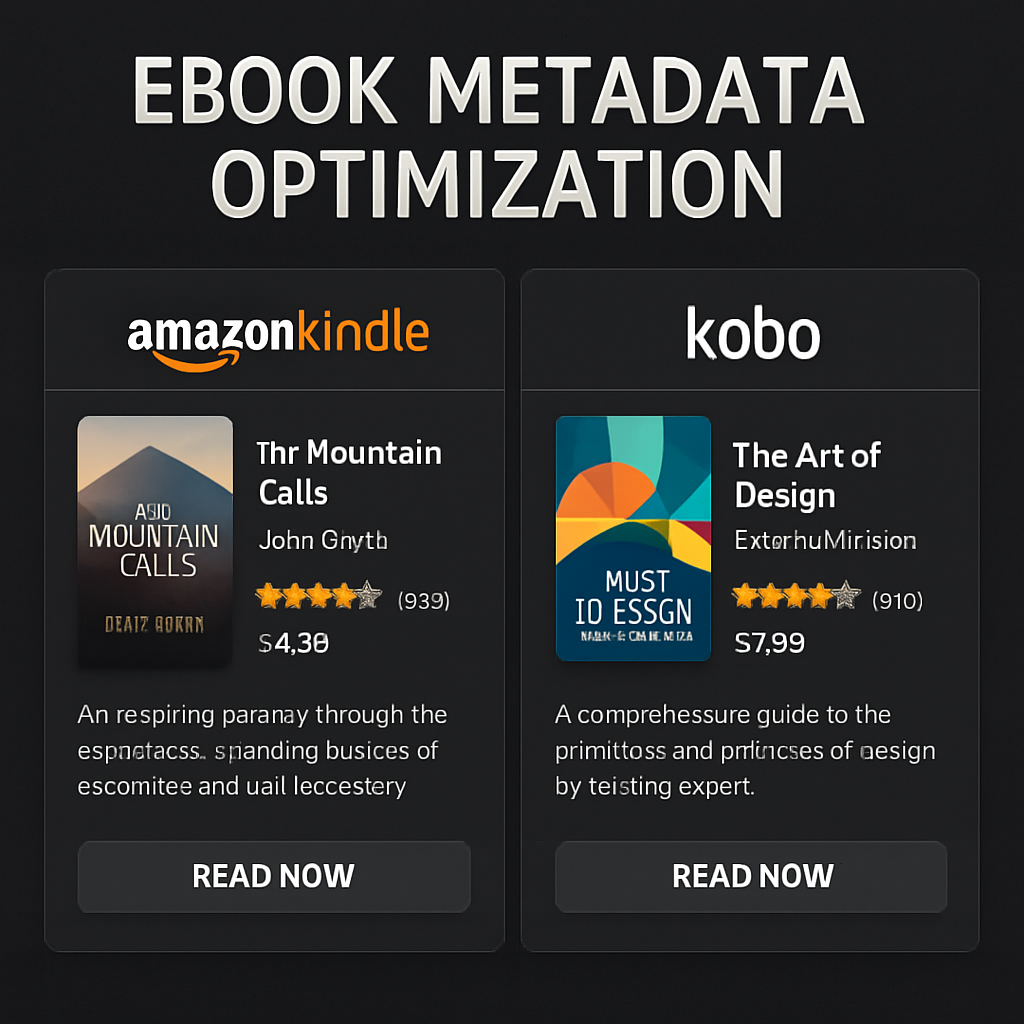In the ever-evolving world of digital publishing, simply releasing an eBook isn’t enough to guarantee success. Authors and publishers must navigate a crowded marketplace where discoverability often dictates sales. This is where Search Engine Optimization (SEO) comes into play—a strategic approach that ensures your eBook surfaces prominently when readers search online platforms. In 2025, with the market saturated by titles across platforms like Amazon Kindle, Smashwords, Kobo, Google Play Books, Apple Books, and others, leveraging SEO is indispensable for anyone aiming to reach their target audience effectively.
SEO for eBooks is no longer a niche skill but a critical marketing component, involving carefully crafted metadata, keyword optimization, and strategic content placement. What once required laborious manual research is now greatly enhanced by AI-driven tools that redefine how authors position their digital works. Integrating AI can streamline the optimization process—finding the right keywords, enhancing readability, and continuously evolving your SEO strategy based on performance analytics.
Moreover, the choice of publishing platforms such as Draft2Digital, BookBaby, Bublish, IngramSpark, or Padma Publishing influences your SEO strategy. Each platform has unique search engine behaviors that, when understood, can be leveraged to maximize visibility. In addition, cross-promotion using social media and professionally optimized sales funnels ensures your eBook does not just get found but also converts visitors into loyal readers.
Throughout this article, we will explore the multifaceted aspects of using SEO to increase your eBook’s visibility, enriched with examples and actionable strategies. From understanding the foundations of eBook SEO, harnessing AI tools, optimizing across platforms, monitoring performance, to continuous improvement—our comprehensive guide seeks to equip authors and publishers with modern techniques tailored for 2025’s digital landscape.
Understanding eBook SEO: Foundations and Its Critical Role in Visibility Across Major Platforms
At its core, eBook SEO is the practice of making your eBook more visible and attractive to search engines, including those embedded within platforms like Amazon Kindle, Google Play Books, and Apple Books. By embedding relevant keywords in your title, description, and metadata, search engines can better understand and rank your content, directing potential readers toward your offering.
The critical importance of eBook SEO lies in discoverability. With millions of digital titles in circulation, standing out organically requires more than compelling content; it demands strategic alignment with search behaviors. For example, a health-focused eBook published on Smashwords can be optimized differently than one on Kobo due to variations in each platform’s search indexing algorithms and user interfaces.
This section also delves into how metadata on platforms like Draft2Digital and IngramSpark can be fine-tuned to enhance search engine rankings. Metadata encompasses your eBook’s title, author name, keywords, and description—critical components that guide both search engines and readers. For instance, an effective metadata strategy might include keyword variations such as “healthy meal plans eBook” and “easy nutritious recipes” to cover broader search queries.
Key Elements of eBook SEO
- Keyword Research: Selecting terms your target audience frequently searches for.
- Metadata Optimization: Crafting titles, subtitles, and descriptions rich with keywords.
- Content Relevance: Ensuring the eBook content aligns closely with keyword themes.
- Platform-Specific Strategies: Tailoring SEO tactics to perform well across different stores like Apple Books or Bublish.
- Link Building: Acquiring backlinks from reputable websites to enhance credibility.
Effective SEO implementation directly correlates with increased placements in search results, heightening the probability that your eBook is discovered by interested readers. For authors exploring how to capitalize on this, resources like navigating the eBook market provide valuable insights into marketplace nuances.
| SEO Element | Role in eBook Visibility | Platform Impact |
|---|---|---|
| Keyword Inclusion | Helps algorithms match search queries to your eBook | Amazon Kindle prioritizes exact keywords; Google Play Books favors semantic relevance |
| Metadata Quality | Improves click-through and relevance signals | Kobo’s metadata parser requires clarity and minimal keyword stuffing |
| Backlinks | Enhances SEO authority and trustworthiness | Effective across all platforms, especially for external search engines |
This foundational knowledge prepares authors and publishers to approach eBook SEO not just as technical tweaking but as a core marketing function necessary for competitive success in 2025.

Harnessing AI to Enhance Your eBook’s SEO: Tools and Techniques for Next-Level Optimization
The integration of Artificial Intelligence into SEO strategies has revolutionized how authors optimize their eBooks for maximum visibility. AI provides sophisticated analytics and automation that reduce manual guesswork and accelerate results. In the realm of eBooks, AI-powered tools facilitate keyword discovery, improve content readability, optimize metadata, and analyze user engagement data to fine-tune SEO efforts continually.
One of the primary challenges in eBook SEO is identifying the most impactful keywords. AI tools like SEMrush, Ahrefs, and Google’s Keyword Planner can process vast datasets to pinpoint keywords with high search volume and manageable competition relevant to your eBook’s topic. For example, if your eBook focuses on “mindful journaling,” AI might suggest related keywords such as “meditation journal guide,” “mindfulness workbook,” or “stress relief journaling techniques.” Integrating these into your metadata and content heightens your eBook’s search ranking potential.
Leveraging AI for Content Refinement and Engagement
- Grammatical and Readability Enhancements: Tools like Grammarly and ProWritingAid ensure your writing is polished, clear, and engaging.
- Sentiment Analysis: Services such as MonkeyLearn provide tone insights to help align content mood with audience expectations.
- Metadata Optimization Recommendations: AI tools suggest keyword adjustments for descriptions and titles based on real-time trends.
- Performance Tracking: AI-powered platforms like Google Analytics monitor user engagement metrics on your eBook’s landing page.
- SEO Automation: Regular AI audits help maintain up-to-date SEO standards as market trends evolve.
AI thus acts as a multipurpose assistant, guiding authors through each step of the optimization journey—from creation to publication and beyond. Especially when publishing through channels such as BookBaby or IngramSpark, AI provides tailored insights that consider platform-specific algorithms.
| AI Tool | Function | Example Application |
|---|---|---|
| SEMrush | Keyword discovery and competitive analysis | Identifying long-tail keywords for a fitness eBook |
| Grammarly | Writing clarity and grammar improvements | Enhancing user-friendly language in a fiction eBook |
| MonkeyLearn | Sentiment and tone analysis | Adjusting motivational tone in self-help content |
For innovative authors wanting to delve deeper into AI applications, exploring engaging ebook writing techniques can further amplify content appeal and SEO results.
Optimizing Your eBook Metadata and Content for Platforms Like Amazon Kindle and Kobo
Metadata is often overlooked but is one of the most critical components when it comes to eBook SEO. It acts as the first impression your eBook makes on search engines and readers alike. Platforms like Amazon Kindle and Kobo have specific metadata formatting requirements and indexing behaviors that, when mastered, can significantly boost your eBook’s discoverability.
An effective metadata strategy includes crafting a compelling title that incorporates key phrases, a subtitle that enhances discoverability, and a description that balances keyword usage with engaging language. For example, on Apple Books, descriptions that include direct calls-to-action and specific benefits tend to perform better in search rankings and conversions.
Content Optimization Tips for SEO Success on Leading eBook Platforms
- Strategic Title and Subtitle Construction: Use primary and latent semantic keywords without keyword stuffing.
- Comprehensive Book Descriptions: Write concise summaries that entice clicks while embedding keywords naturally.
- Category and Tag Selection: Choose accurate categories and tags available on platforms like Smashwords and Draft2Digital to target niche readers.
- Incorporate Backlinks: Encourage reviews or citations linking to landing pages to build SEO authority externally.
- Utilize Platform Features: For instance, Bublish offers content marketing tools that can boost SEO through enhanced content visibility.
Understanding platform nuances helps ensure each eBook sees maximum SEO benefit from tailored metadata. Detailed guides on best platforms to sell eBooks provide insights on how to adapt your publishing approach effectively.
| Platform | Metadata SEO Focus | Recommended Practices |
|---|---|---|
| Amazon Kindle | Exact keyword match in title and description | Maintain analytics on keyword performance, frequent updates to description |
| Kobo | Semantic keyword inclusion, category precision | Use niche categories, avoid keyword stuffing |
| Google Play Books | Content depth and natural language emphasis | Focus on detailed descriptions and comprehensive metadata |
Mastering metadata optimization can dramatically increase your eBook’s visibility across digital marketplaces in 2025 and beyond.

Measuring and Tracking eBook SEO Performance Using AI Analytics Tools
Publishing an optimized eBook is just the beginning. Tracking its performance using data-driven insights is vital to ongoing success. AI-powered analytics provide unprecedented access to reader behavior, keyword effectiveness, and engagement metrics on your eBook’s landing pages and across sales channels.
Google Analytics integration allows you to monitor traffic sources, keyword referrals, and bounce rates on your promotional pages. Such data empowers authors to identify which SEO elements drive results and which require refinement. For example, if a keyword generates significant traffic but has a high bounce rate, it signals a mismatch between user expectations and content. Adjustments can be made to the metadata or eBook content accordingly.
Tools and Key Metrics for SEO Performance Assessment
- Traffic Sources: Identify where your visitors come from, whether direct search, social media, or affiliates.
- Keyword Rankings: Track how your chosen keywords perform across platforms over time.
- Engagement Metrics: Average time on page, scroll depth, and click-through rates to measure reader interest.
- Conversion Rates: Percentage of visitors who download or purchase your eBook.
- Competitor Analysis: Use AI tools to benchmark against similar eBooks and adjust strategies accordingly.
Using this data-driven approach, authors publishing through platforms like BookBaby, Padma Publishing, or Draft2Digital can iterate rapidly and stay ahead of SEO trends. For more detailed guidance on promoting an eBook effectively, visiting promote your eBook online can provide actionable marketing techniques that complement SEO efforts.
| Metric | Purpose | Tool Example |
|---|---|---|
| Keyword Ranking | Track SEO keyword effectiveness | Ahrefs, SEMrush |
| Traffic Source Analysis | Identify marketing channel success | Google Analytics |
| Engagement Rate | Assess content relevance and quality | Hotjar, Crazy Egg |
| Conversion Rate | Measure sales/downloads efficacy | Shopify analytics if applicable |
Continuous SEO Improvement: Staying Competitive with AI-Driven Updates and Adaptive Strategies for eBook Visibility
SEO is not a one-time task but a continuous journey. Search engines and platform algorithms evolve, and so should your SEO tactics for sustained eBook visibility. Leveraging AI enables authors and publishers to stay adaptive by constantly monitoring performance and integrating emerging keywords and trends into their strategy.
For instance, the rise of voice search and AI chatbots is reshaping keyword approaches—long-tail, natural language phrases now gain prominence. Authors who update their titles, subtitles, and metadata to align with these changes will secure ongoing discovery benefits. Publishers using IngramSpark and Padma Publishing platforms find that periodic SEO refreshes yield steady gains in traffic and sales.
Best Practices for Proactive SEO Maintenance
- Regular Keyword Audits: Use AI tools monthly to identify new keyword opportunities.
- Metadata Updates: Revise descriptions and categories seasonally to align with reader interests.
- Content Refinement: Add updated chapters or bonus material to keep content relevant.
- Engage through Social Media: Promote your eBook on channels strategically and link back to your sales platforms.
- Monitor Competitors: Analyze market shifts and competitor strategies to adjust your own.
These ongoing efforts combined with AI-powered insights support sustained success. Integrating approaches outlined in resources like author branding for ebook sales further enhances your market positioning.
| SEO Maintenance Task | Frequency | Tools/Methods |
|---|---|---|
| Keyword Research | Monthly | SEMrush, Ahrefs |
| Metadata Revision | Quarterly | Self-editing, AI recommendations |
| Content Enhancement | Biannual | Reader feedback and AI analysis |
| Social Media Promotion | Weekly/Monthly | Scheduled posts, affiliate marketing |
Frequently Asked Questions about Enhancing eBook Visibility with SEO
- Q: How important is keyword research for eBook SEO?
A: Keyword research is foundational. It ensures your eBook aligns with actual search terms readers use, directly impacting visibility and sales. - Q: Can AI tools replace manual SEO efforts for eBooks?
A: AI tools greatly enhance efficiency and provide data-driven insights, but human creativity and oversight are essential for nuanced optimization. - Q: Which platforms offer the best SEO potential for eBooks?
A: Amazon Kindle offers vast reach but high competition; platforms like Smashwords, Kobo, and Draft2Digital provide valuable niche targeting opportunities. - Q: How often should I update my eBook’s SEO metadata?
A: Regular updates quarterly or biannually keep metadata relevant and aligned with evolving search trends. - Q: Is backlink building important for eBook SEO?
A: Yes, quality backlinks from trusted sites boost authority, improving search engine rankings and credibility.


